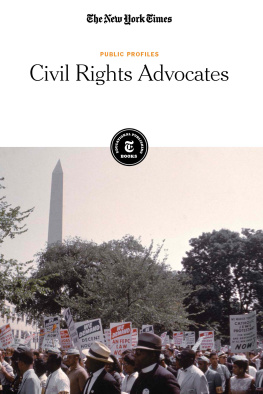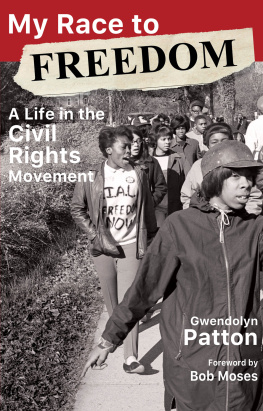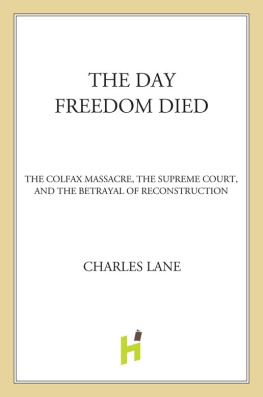PRAISE FOR ON THE ROAD TO FREEDOM
The great strength of this book is that it is the story of people and not simply a repetition of dates and a listing of places and events. Put this book on your must-read list!
JULIAN BOND, chairman of the NAACP
This book represents a rare opportunity to walk through the pages of history with a man who was there. A window to a not-so-distant past, it reveals the heart and soul of a movement that transformed America.
REP. JOHN LEWIS
This is totally engaging storytelling.... This book should be in the hands of all those who care about this history, but more important, it should be in the hands of all those who dont, at least not yet.
JUDY RICHARDSON, series associate producer for
Eyes on the Prize
Brilliantly honors the struggles, the dreams, and the sacrifices of the past. On the Road to Freedom is must reading. Charlie Cobb reminds us that history is not some dead, long-ago series of events. As a veteran civil rights activist remembering and revisiting his journey, he guides us in rediscovering an important historical moment in our collective journey.
DANNY GLOVER
Cobb has written a well-researched and engaging book, enriched by his vivid tales of remarkable acts of resistance to injustice.
CLAYBORNE CARSON, director of the Martin Luther King Jr.
Research and Education Institute at Stanford University
Truly extraordinary. [Cobb] combines his personal knowledge, his knowledge of history, and his writers ability to take us on a physical and emotional journey on the road to freedom.
CONSTANCE CURRY, author of Silver Rights
Geographer of an era and its battlegrounds, Cobb brings alive Americas last good war and its many heroes, unsung as well as famous. From chapter to chapter, you are there.
HODDING CARTER III
This remarkable book is the product of a rare combination of historical analysis, insight, and personal acquaintance with some of the most important activists of our time. In the course of introducing us to the places of the movement, Cobb gives us a crash course in the people and personalities who made these places historically significant. We actually get to see how movement culture evolved. Time and again we are reminded of how many different kinds of people it took to make the movement. Time and again we are reminded that one never knows which spark will start the fire.
CHARLES PAYNE, author of Ive Got the Light of Freedom
This essential book makes a major contribution to understanding the grassroots organizing that gave the Southern civil rights movement its strength.
WILLIAM RASPBERRY, Pulitzer Prizewinning columnist
On the Road to Freedom is a very important American story.... Cobb paints a brilliant picture of the civil rights movement, the people and communities that gave it texture. This journey down the long road of freedom is memorable and a must-read for everyone, especially our youth.
HARRY BELAFONTE
ALSO BY CHARLES E. COBB JR.
Radical Equations:
Civil Rights from Mississippi to the Algebra Project
(with Robert P. Moses)
No Easy Victories:
African Liberation and American Activists
over a Half Century, 19502000
(edited by William Minter, Gail Hovey, and Charles E. Cobb Jr.)
ON THE ROAD TO FREEDOM
A Guided Tour of the Civil Rights Trail
BY CHARLES E. COBB JR.
Algonquin Books of Chapel Hill
Published by
Algonquin Books of Chapel Hill
Post Office Box 2225
Chapel Hill, North Carolina 27515-2225
a division of
Workman Publishing
225 Varick Street
New York, New York 10014
2008 by Charles E. Cobb Jr. All rights reserved.
Photo research by Leora Khan.
For permission to reprint excerpts and photographs, grateful acknowledgment is made to those mentioned on pp. 37475, which constitute an extension of the copyright page.
Library of Congress Cataloging-in-Publication Data is available.
E-book ISBN 978-1-61620-226-2
This book is dedicated to three great women, who took me by the hand and soul, and guided me until I learned the way: Mrs. Fannie Lou Hamer, Mrs. Annie Bell Robinson Devine, and Mrs. Victoria Gray Adams.
If there is no struggle, there is no progress. Those who profess to favor freedom, and yet depreciate agitation, are men who want crops without plowing up the ground. They want rain without thunder and lightning. They want the ocean without the awful roar of its many waters. This struggle may be a moral one; or it may be a physical one; or it may be both moral and physical; but it must be a struggle. Power concedes nothing without a demand. It never did and it never will. Find out just what a people will submit to, and you have found out the exact amount of injustice and wrong which will be imposed upon them; and these will continue till they are resisted with either words or blows, or with both. The limits of tyrants are prescribed by the endurance of those whom they oppress. Men may not get all they pay for in this world; but they must pay for all they get. If we ever get free from all the oppressions and wrongs heaped upon us, we must pay for their removal. We must do this by labor, by suffering, by sacrifice, and, if needs be, by our lives, and the lives of others.
FREDERICK DOUGLASS, 1857
CONTENTS
CHAPTER ONE
My Country Tis of Thee: Washington, D.C. 1
CHAPTER TWO
Up South: Annapolis, Cambridge, and Baltimore, Maryland
CHAPTER THREE
Dont Carry Me Back: Arlington and Alexandria,
Richmond, Hampton, Farmville, and Danville, Virginia
CHAPTER FOUR
More Than a Hamburger: Greensboro, Raleigh,
and Durham, North Carolina
CHAPTER FIVE
Ill Overcome: Charleston, Columbia,
Rock Hill, Orangeburg, and Clarendon County,
South Carolina
CHAPTER SIX
... On My Mind: Atlanta, Albany, and
Savannah, Georgia
CHAPTER SEVEN
Look Backward, Move Forward: Montgomery,
Selma, Lowndes County, Perry County, and
Birmingham, Alabama
CHAPTER EIGHT
Dont Know How We Were So Brave: Jackson, Philadelphia, McComb, Greenwood,
and Ruleville, Mississippi
CHAPTER NINE
Full Circle: Nashville, Knoxville, and
Memphis, Tennessee
ACKNOWLEDGMENTS
First, I must immediately acknowledge here all of the heroes and heroines across the South, and across the centuries of Afro-American life, who, through their organized resistance to slavery, segregation, and the racism that poisoned so much of their lives, made the story told in these pages possible. They have been, and remain, an inspiration to me and, just as important, my teachers. In many, many ways, this book is their book.
Love and gratitude to my wife, Ann, and daughter, Zora. They were tolerant and patient with my clutter, my moods, and the many days and hours I was lost in the book.
I have long struggled with what works and what does not work in conveying the events that are now grouped together as the civil rights movement, so special thanks to Dr. Anthony Bogues, chair of Brown Universitys Africana Studies Department. In inviting me to teach as a visiting professor at the university, he gave me an unexpected opportunity to work on a storytelling language in the classroom with young students, for whom this era is a distant time. Significant portions of the Georgia, Alabama, and Mississippi chapters were drawn from lectures given in my undergraduate seminar at the university: The Organizing Tradition of the Southern Civil Rights Movement.






